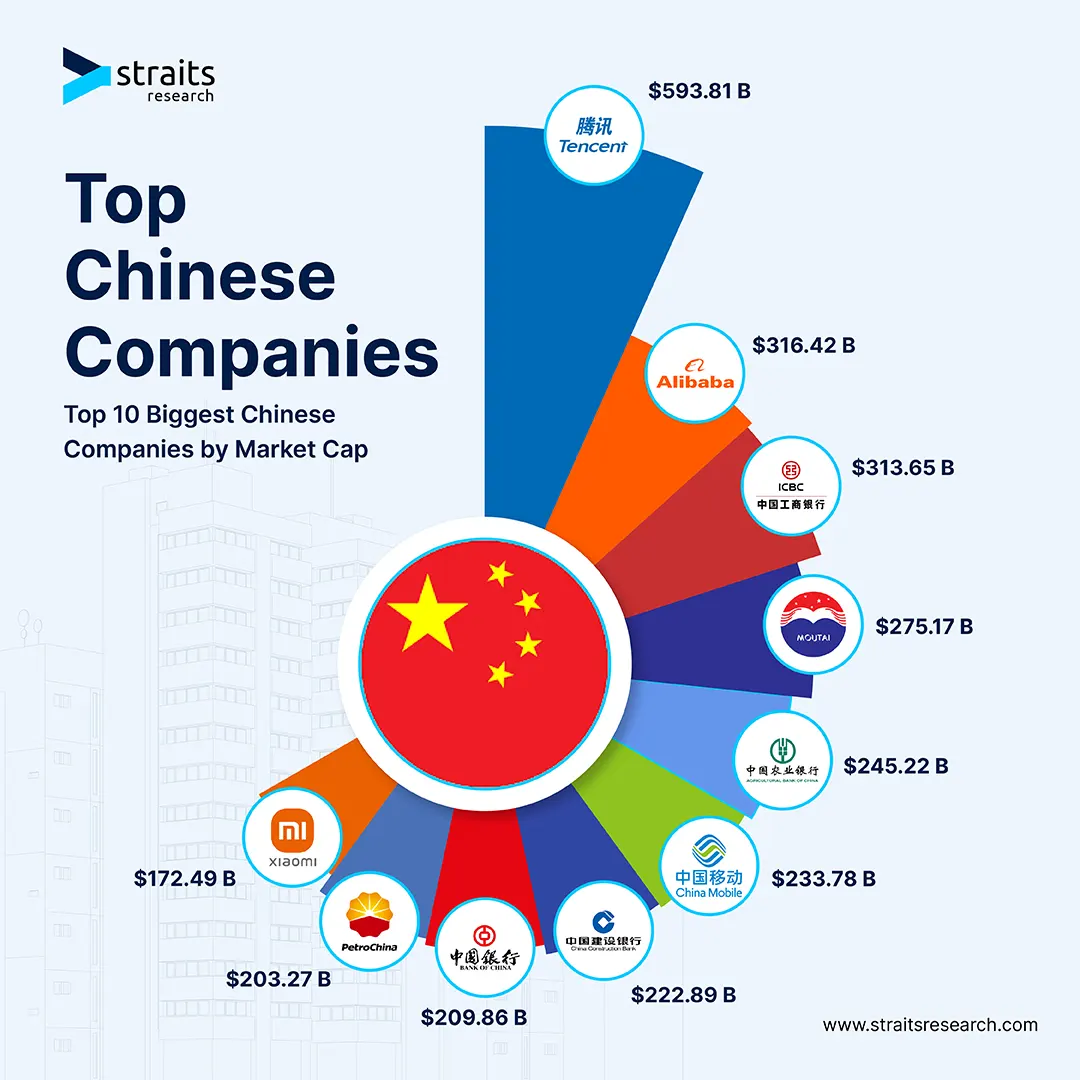China’s 10 Largest Companies by Market Cap in March 2025

China's leading companies are essential to the country's economic growth, technical innovation, and international influence. These companies establish China as a major participant in a number of industries by generating significant wealth, promoting global trade, and making significant investments in research and development (R&D). These companies grow quickly and successfully compete in international markets, especially in AI, 5G, and e-commerce, due to substantial government support. They take advantage of chances for expansion and innovation while negotiating difficulties in foreign markets, enhancing China's position in the global economy.
Leading companies
As of March 2025, the top 10 Chinese companies by market capitalization show the nation's dominance across multiple sectors. Tencent leads with a market cap of $593.81 billion, followed by Alibaba ($316.42 billion) and the Industrial and Commercial Bank of China (ICBC) at $313.65 billion. Kweichow Moutai, a renowned liquor company, is valued at $275.17 billion, while the Agricultural Bank of China ($245.22 billion) and China Mobile ($233.78 billion) follow closely. Other major corporations include China Construction Bank ($222.89 billion), Bank of China ($209.86 billion), PetroChina ($203.27 billion), and Xiaomi ($172.49 billion).
China's largest industries by revenue further emphasize its financial strength. Copper ore mining dominates with an astounding $13,897.9 billion in revenue, followed by the building construction industry at $2,797.4 billion. The online shopping sector flourishes with $2,547.5 billion in revenue, while real estate development and management contribute $2,086.6 billion. Additionally, the mail-order and online shopping industry generates $2,067.5 billion, with residential real estate close behind at $1,709.0 billion. Major infrastructure projects, such as bridge, tunnel, and subway construction, account for $1,563.5 billion, while software development earns $1,331.3 billion. Steel rolling and oil & petroleum refining contribute $1,296.4 billion and $1,007.1 billion, respectively.
All of China's top companies are involved in these profitable sectors. Alibaba controls online shopping and mail-order retail, while Tencent is a big force in software development and online commerce. Financial institutions that do not directly work in real estate development or large infrastructure projects, such as ICBC, Agricultural Bank of China, China Construction Bank, and Bank of China, offer essential financial services to support these sectors. China Mobile specializes in telecommunications, PetroChina works in the oil and petroleum refining industry, Xiaomi concentrates on consumer electronics, and Kweichow Moutai is in charge of the liquor industry.
Employment and revenue trends
These companies also promote gender diversity and job growth. Tencent employed 110,558 people on December 31, 2024, a 4.88% rise from the year before. By the end of 2023, ICBC employed 419,252 individuals, compared to Alibaba's 204,891 in March 2024. With more than 35% of its global patent applications coming from female inventors, Tencent has actively encouraged diversity. Alibaba's dedication to gender equality is evident in the fact that women make up more than 40% of its employees and almost 35% of its senior managers. Furthermore, women make up about one-third of Alibaba's top leadership and founders. Although just 8.3% of ICBC's staff was in senior management, women made up 49.3% of the company's workforce in 2021.
Revenue trends show the financial strength of these companies. Tencent's international gaming division saw a 15% year-over-year increase, generating 16 billion yuan ($2.21 billion), while domestic gaming revenue surged 23% to 33.2 billion yuan ($4.6 billion). Alibaba's domestic e-commerce platforms, Taobao and Tmall, accounted for 46% of total revenue in 2023. Its international e-commerce segment, including AliExpress and Trendyol, grew by 36% year-over-year in Q4 2024, generating RMB31.55 billion ($4.32 billion). ICBC's global expansion continues to bolster its profitability, with overseas subsidiaries significantly increasing net profit by 49% in 2010 and intermediary business revenue rising by 47%.
Although Kweichow Moutai is growing globally, its primary source of income is domestic baijiu sales. The company's operating revenue in 2023 was 150.56 billion yuan ($20.81 billion), representing an 18.04% increase from the previous year. In a similar vein, the Agricultural Bank of China (ABC) reported a 2023 net profit of RMB 269.82 billion, up from 2021's RMB 241.94 billion. ABC supports local and international financial activity through its 22,807 domestic branch outlets and 13 abroad branches. Despite continuing to have a growing global footprint, China Mobile, China Construction Bank, and Bank of China nevertheless make the majority of their money from domestic operations.
China's financial markets have also shown strong performance. The MSCI China Index grew 21.82% in sterling terms, compared to 27.32% for the U.S., 20.13% for the global market, and 14.42% for India. Since the new international Investment Law was put into effect in 2020, China has gradually lifted its limits on international investment. Important measures include simplifying investment processes and lifting restrictions on foreign ownership in industries like life insurance and auto manufacturing.
China's top companies continue to influence the world economy. These companies continue to be at the forefront of technical and economic advancement as they overcome challenges and pursue new opportunities, strengthening China's standing as an important global player.




